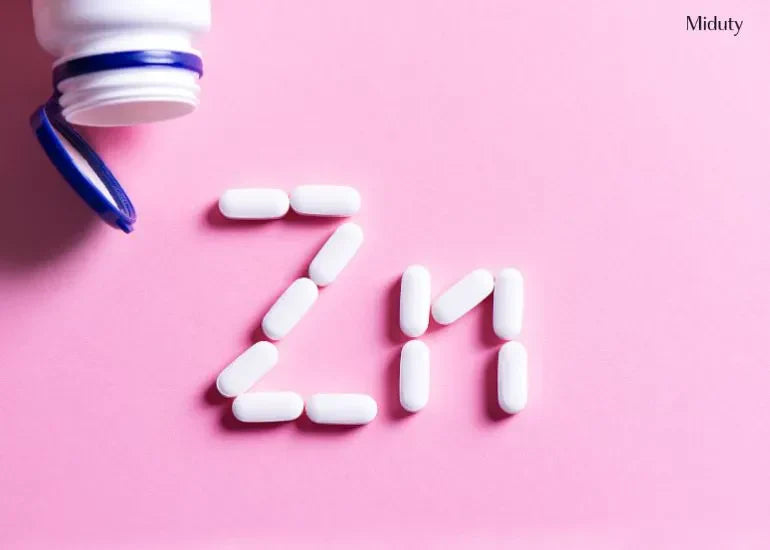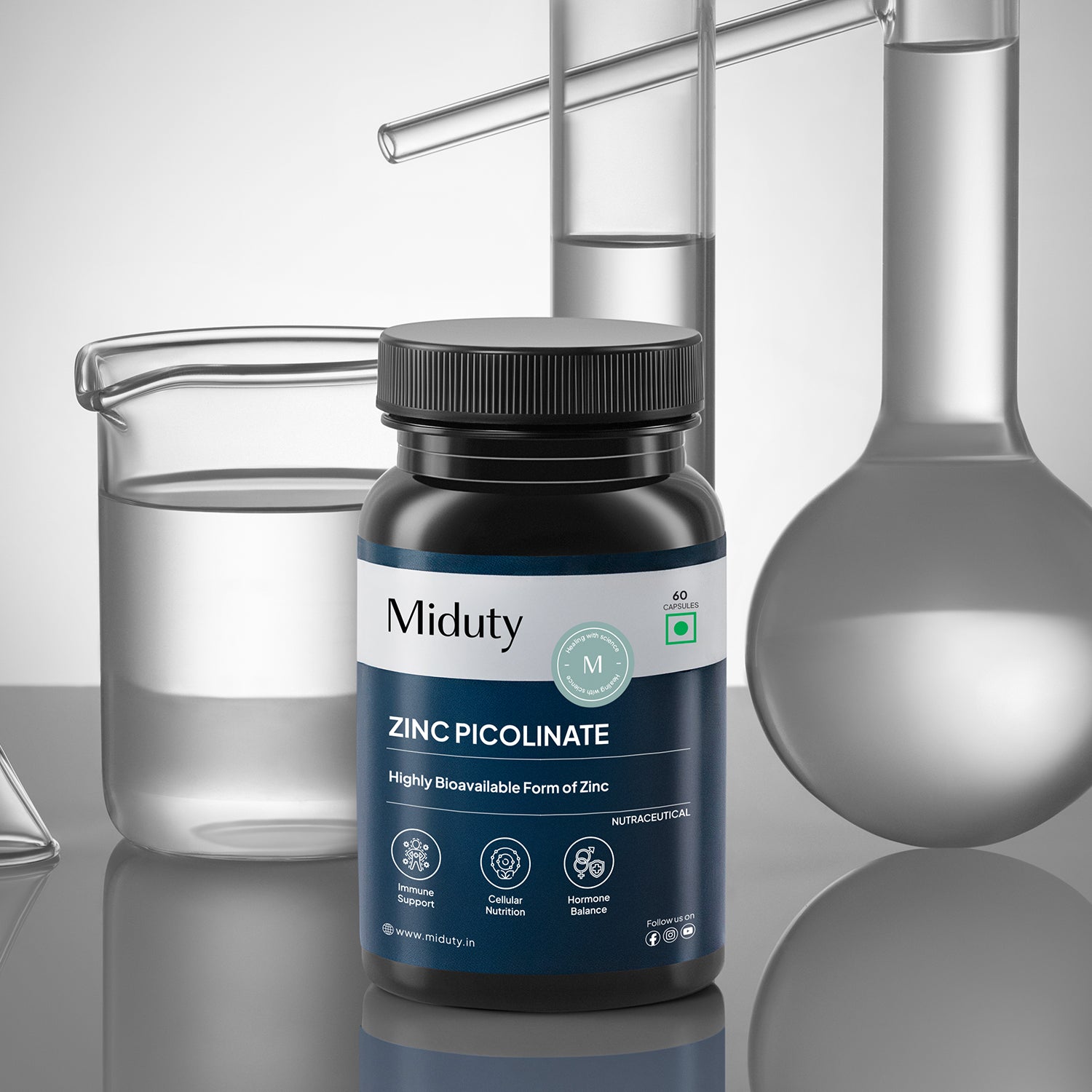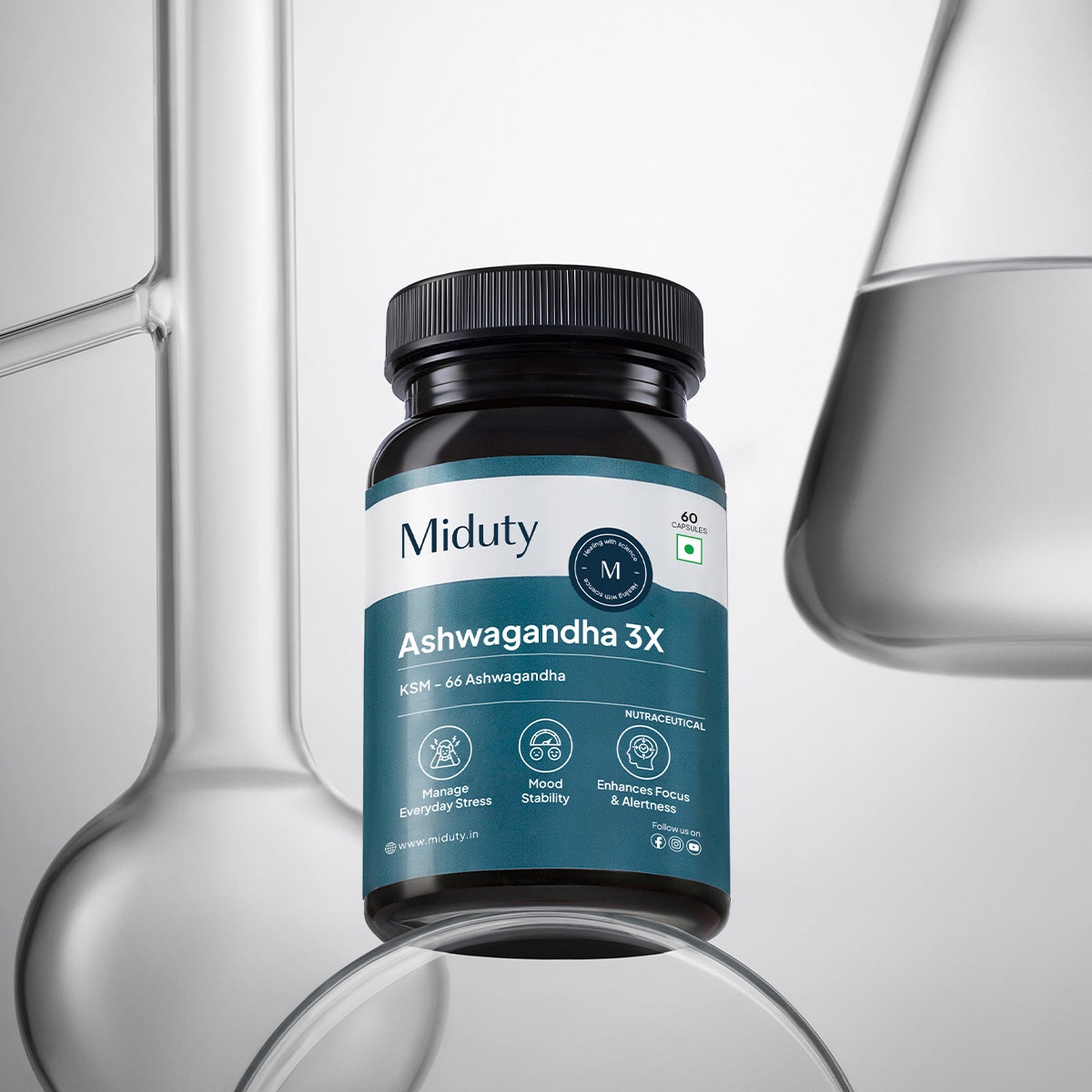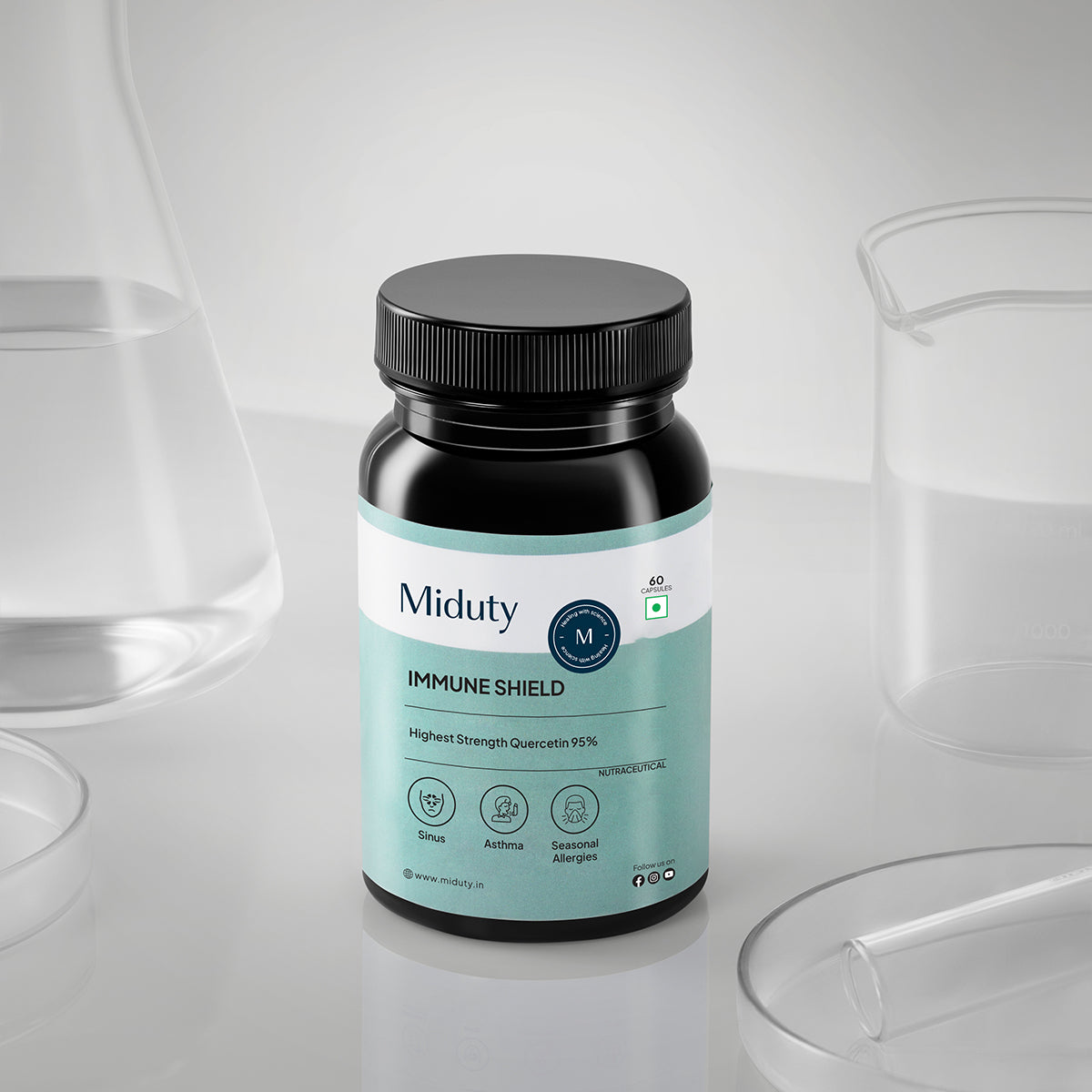
Why Is Zinc Picolinate The Better Absorbed Form of Zinc?
Zinc is an essential trace mineral involved in hundreds of biological processes, including immune function, wound healing, DNA synthesis, and cell division. Because the human body cannot produce zinc on its own, it must be obtained through diet or supplementation. However, not all zinc supplements are created equal. The form of zinc plays a major role in how efficiently it is absorbed and utilized by the body. Among the various types available, zinc picolinate stands out as one of the most bioavailable and effective forms.
This article explores why zinc picolinate offers superior absorption compared to other zinc forms, how it works in the body, and what benefits it provides for overall health.
Key Takeaways
1. Zinc picolinate delivers superior absorption because picolinic acid naturally enhances mineral transport across the intestinal wall, ensuring more zinc enters the bloodstream.
2. Chelated stability gives zinc picolinate an edge by protecting it from compounds like phytates that inhibit absorption in other zinc forms.
3. Scientific studies confirm higher tissue retention, showing zinc picolinate achieves greater zinc levels in the body compared to citrate, gluconate, and sulfate forms.
4. Better absorption means stronger results—zinc picolinate more effectively supports immunity, skin repair, hormonal balance, metabolism, and brain health.
5. Zinc picolinate is efficient and gentle, offering high bioavailability, excellent gastrointestinal tolerance, and reliable nutrient delivery for optimal wellness.
Understanding Zinc Absorption
Zinc absorption occurs primarily in the small intestine. However, several factors influence how much zinc the body can absorb, including dietary composition, the presence of phytates (compounds found in grains and legumes that bind minerals), and the chemical form of the zinc supplement itself. Zinc must be in a soluble, ionized form to pass through the intestinal wall into the bloodstream.
Different zinc supplements provide zinc bound to various compounds, called chelates or salts. The bond between zinc and its carrier molecule affects the mineral's stability, solubility, and absorption rate. Organic forms of zinc, which include zinc bound to amino acids or organic acids, generally have higher bioavailability than inorganic forms.
What Are The Common Forms of Zinc?
Before exploring zinc picolinate specifically, it helps to understand how other zinc forms compare.
1. Zinc Gluconate
Zinc gluconate is one of the most common forms found in over-the-counter supplements and lozenges. It is a zinc salt of gluconic acid and is known for being well-tolerated. While absorption is decent, the gluconate form does not demonstrate the highest bioavailability among zinc compounds.
2. Zinc Citrate
Zinc citrate is a zinc salt of citric acid and offers relatively good absorption. It dissolves easily in water and is less likely to cause stomach upset than some other forms. However, studies indicate that while zinc citrate is well absorbed, zinc picolinate surpasses it in terms of uptake into body tissues.
3. Zinc Sulfate
Zinc sulfate is an inorganic form often used for treating zinc deficiency. It contains a high percentage of elemental zinc, but it is also known to cause gastrointestinal discomfort, including nausea. Its absorption rate is lower compared to organic zinc chelates.
4. Zinc Oxide
Zinc oxide contains a high concentration of zinc, but it has poor solubility in water, leading to low absorption. It is commonly used in topical applications like sunscreens and ointments rather than oral supplements.
5. Zinc Methionine
Zinc methionine is a chelated form in which zinc is bound to the amino acid methionine. It is well absorbed and stable in the digestive tract. Studies show that zinc methionine performs better than inorganic forms, though zinc picolinate still appears to achieve higher tissue concentrations in comparative trials.
What Is Zinc Picolinate?
Zinc picolinate is a chelated form of zinc in which the mineral is bound to picolinic acid. Picolinic acid is a natural metabolite produced by the human body from the amino acid tryptophan. This compound acts as a chelating agent, helping transport minerals across the intestinal wall and into the bloodstream.
Because picolinic acid naturally supports mineral absorption in the body, its combination with zinc creates a highly effective delivery system. The result is a form of zinc that is efficiently absorbed, transported, and retained in tissues.
Why Is Zinc Picolinate Better Absorbed In Body?
The superior absorption of zinc picolinate is primarily due to the unique properties of picolinic acid. This molecule facilitates the movement of zinc ions across biological membranes. The chelation process stabilizes zinc, preventing it from forming insoluble complexes in the gastrointestinal tract that would otherwise limit absorption.
Here is how zinc picolinate achieves this advantage:
1. Chelation and Stability
The chelation of zinc with picolinic acid forms a stable, fat-soluble complex that stays intact as it moves through the digestive system. This stability prevents zinc from reacting with compounds like phytates and fibers found in food, which would normally trap zinc and make it harder for the body to absorb. As a result, more zinc remains available for absorption.
2. Enhanced Transport Across the Intestinal Lining
Picolinic acid acts as a natural carrier that helps zinc pass through the intestinal wall and into the bloodstream. It assists in moving zinc ions across cell membranes efficiently, reducing the amount of zinc that gets lost or excreted during digestion. This ensures that more of the mineral actually reaches the body's circulation.
3. Improved Bioavailability
Because zinc picolinate is easily absorbed and well-protected during digestion, a greater amount of zinc becomes available in its active, usable form. This means the body can utilize zinc more effectively for functions like immune support, wound healing, and enzyme activity compared to other forms of zinc supplements.
4. Increased Tissue Retention
Studies show that zinc picolinate not only enhances how much zinc enters the bloodstream but also helps it stay longer in key organs and tissues. Higher zinc levels have been observed in the liver, muscles, and immune cells, which means the body can maintain sufficient zinc stores for longer periods and support essential metabolic processes.
Comparison with Other Zinc Forms
The following key differences explain why zinc picolinate outperforms other forms:
|
Zinc Form |
Type |
Absorption Level |
Gastrointestinal Tolerance |
Notes |
|
Zinc Oxide |
Inorganic |
Low |
Moderate |
Poor solubility; limited absorption |
|
Zinc Sulfate |
Inorganic |
Moderate |
Low |
Can cause nausea; inexpensive |
|
Zinc Gluconate |
Organic |
Moderate |
High |
Commonly used; moderate absorption |
|
Zinc Citrate |
Organic |
Good |
High |
Better than gluconate but below picolinate |
|
Zinc Methionine |
Chelated |
Very Good |
High |
High absorption; effective alternative |
|
Zinc Picolinate |
Chelated |
Excellent |
High |
Best absorption and retention |
The chelated structure and natural compatibility with the body's own absorption system make zinc picolinate stand out among these forms.
Health Benefits of Zinc Picolinate
Because zinc picolinate is absorbed more efficiently, it provides more reliable support for the numerous physiological functions dependent on zinc.
1. Immune System Support
Zinc is critical for immune cell development and function. Efficient absorption ensures consistent zinc levels, helping the body fight infections more effectively and recover faster. [1]
2. Skin Health
Zinc plays a key role in collagen synthesis, wound healing, and inflammation control. Zinc picolinate's superior bioavailability supports clearer skin and faster repair of damaged tissues. [2]
3. Hormonal and Reproductive Health
Zinc regulates testosterone levels, sperm production, and reproductive function in both men and women. Improved absorption from zinc picolinate ensures optimal hormone balance. [3]
4. Cognitive Function
Zinc contributes to neurotransmitter regulation and brain health. Adequate zinc levels have been linked to better memory and mood regulation. Zinc picolinate ensures efficient transport of zinc to the brain.
5. Metabolism and Energy Production
Zinc acts as a cofactor for enzymes involved in carbohydrate, protein, and fat metabolism. Enhanced absorption supports better nutrient utilization and energy balance.
6. Antioxidant Protection
Zinc contributes to antioxidant defenses by supporting enzymes such as superoxide dismutase. Zinc picolinate's higher tissue retention strengthens cellular protection against oxidative stress.
Practical Considerations When Taking Zinc Picolinate
1. Dosage
Most adults require between 8–11 mg of zinc per day, though therapeutic doses may range up to 30 mg under medical supervision. Because zinc picolinate is efficiently absorbed, lower doses often suffice to achieve desired blood levels compared to less bioavailable forms.
2. Timing
Zinc supplements should ideally be taken with food to reduce the risk of stomach discomfort, though absorption may be slightly higher on an empty stomach.
3. Interactions
High doses of zinc can interfere with the absorption of copper and iron. Some supplements combine zinc with small amounts of copper to maintain mineral balance.
4. Safety
When used within recommended limits, zinc picolinate is safe and well tolerated. Long-term excessive intake, however, can cause nausea, headaches, or mineral imbalances.
Why Choose Zinc Picolinate?
The goal of taking a zinc picolinate supplement is not just to consume a nutrient but to ensure it is absorbed and utilized effectively. Zinc picolinate offers several distinct advantages:
- Highest bioavailability among zinc forms
- Strong resistance to absorption inhibitors like phytates
- Natural compatibility with human mineral metabolism
- Excellent gastrointestinal tolerance
- Proven scientific support for superior tissue retention
These qualities make zinc picolinate an ideal choice for individuals seeking reliable and efficient zinc supplementation.
Conclusion
Zinc plays an indispensable role in health, influencing immunity, growth, metabolism, and cognitive performance. However, the effectiveness of zinc supplementation depends on how well the mineral is absorbed. Zinc picolinate, through its chelation with picolinic acid, offers superior absorption and retention compared to other zinc forms such as zinc gluconate, zinc citrate, and zinc sulfate. Scientific studies confirm that the body assimilates and utilizes zinc picolinate more effectively, leading to greater physiological benefits.
For individuals seeking to correct zinc deficiency, enhance immune function, or support general wellness, zinc picolinate provides a scientifically validated, highly bioavailable option that delivers results with efficiency and reliability.
FAQ's on Zinc Picolinate Absorption -
Q1 - What is the best absorbed form of zinc?
The best-absorbed forms of zinc are zinc picolinate, zinc glycinate, and zinc gluconate. These forms are chelated, meaning the zinc is bound to an amino acid or organic compound, which helps it pass more easily through the intestinal wall and into the bloodstream. Among them, zinc picolinate is often considered the most efficiently absorbed, thanks to the unique role of picolinic acid in enhancing zinc uptake.
Q2 - Which one is better, zinc or zinc picolinate?
Zinc picolinate is considered better than plain zinc because the body absorbs it more efficiently. In this form, zinc is bound to picolinic acid, a natural compound that helps transport zinc across the intestinal wall into the bloodstream. This enhanced absorption means your body can use zinc more effectively for functions like immune support, skin health, and overall wellness.
Q3 - Is zinc picolinate easy to absorb?
Yes, zinc picolinate is known for its excellent absorption in the body. Research shows that it offers higher bioavailability than many other forms, such as zinc gluconate. Because it's more efficiently absorbed, zinc picolinate is often recommended for those who need optimal zinc levels. Additionally, it may be gentler on the stomach, making it a good choice for people with sensitive digestion.
Q4 - What boosts zinc absorption?
Zinc absorption is boosted by protein, especially animal protein, which enhances the absorption of zinc from a meal. Other factors that increase zinc absorption include organic acids like citrate, and adequate magnesium intake, while high levels of phytates (found in some plant-based foods) can hinder it.
Q5 - What is the best way to take zinc picolinate?
For best absorption, zinc should be taken on an empty stomach, about 30 minutes before a meal or two hours after eating. However, if it causes any stomach discomfort, it's perfectly fine to take it with food. Zinc lozenges can also be beneficial, as studies suggest they may help reduce the duration and severity of a cold when taken at the first signs of illness.
References













